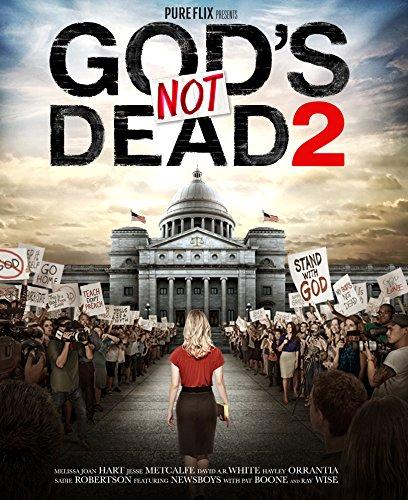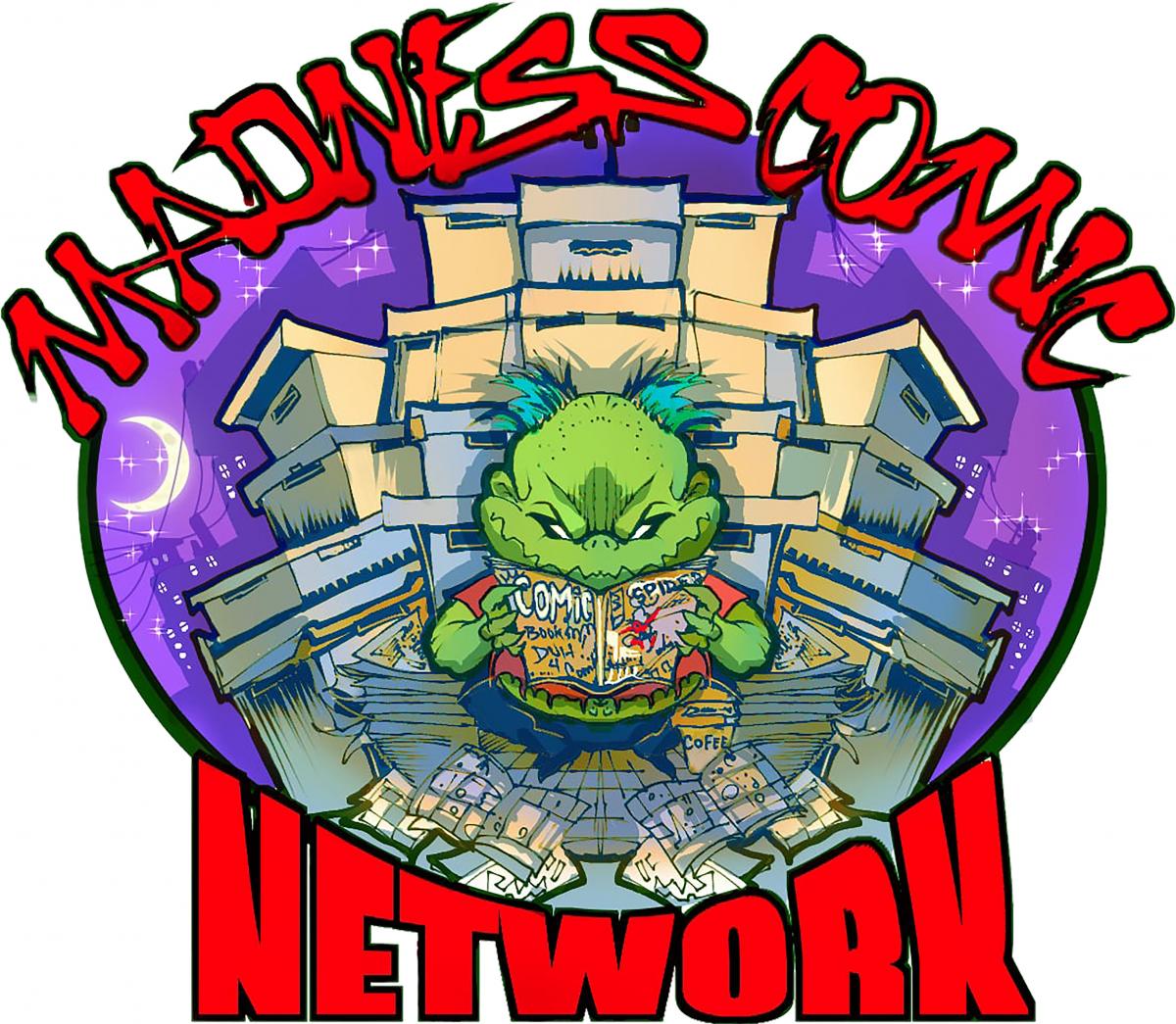God's Not Dead 2 Not Quite as Alive as its Prequel
FTC Statement: Reviewers are frequently provided by the publisher/production company with a copy of the material being reviewed.The opinions published are solely those of the respective reviewers and may not reflect the opinions of CriticalBlast.com or its management.
As an Amazon Associate, we earn from qualifying purchases. (This is a legal requirement, as apparently some sites advertise for Amazon for free. Yes, that's sarcasm.)

With the first GOD'S NOT DEAD movie, the setting was the college campus, a forum of relatively free discourse even when pitting student against teacher. In GOD'S NOT DEAD 2, the stage shifts to the high school, where an A.P. history teacher known for her optimism is asked a question comparing the non-violent teachings of Dr. Martin Luther King Jr. and Mahatma Gandhi to Jesus. When the teacher, Grace Wesley (Melissa Joan Hart, MELISSA & JOEY), answers the question, quoting the teaching that would align with the philosophy, it gets recorded and sent to the world. Suddenly, Grace is facing down the school board and ultimately a jury when it's determined that her statements violate local, state and federal laws regarding the separation of church and state, after the parents of the student are cajoled into filing a lawsuit by a conniving attorney, Peter Kane (Ray Wise, TWIN PEAKS, REAPER) who has been chomping at the bit for a case like this.
Grace is supported throughout by her grandfather (Pat Boone) and the questioning student, Brooke (Hayley Orrantia, THE GOLDBERGS), but she's also turned on by those she thought were her friends, including the school principal (Robin Givens) and her union representative (Natalie Canerday), who apparently aren't above stretching the truth to get the conviction.
Grace's attorney, appointed by the union, is Tom Endler (Jesse Metcalfe, DALLAS). Tom is not a believer, but he thinks that will be a help in the case, as he won't be seen as biased by the jury. However, as the case continues to go downhill, he decides -- inspired by Grace -- to take a different tact, and to bring in expert testimony to prove the historical existence of Jesus Christ. Plot-wise, this seemed to have Tom walking the same path as did Fred Gailey (John Payne) in MIRACLE ON 34TH STREET, when he switches tactics on Kris Kringle's insanity defense by setting out to prove the existence of Santa Claus. However, it's a far more sound approach in this story, as the exclusion of an historical figure solely on the basis of his or her ties to a religious movement would be seen as discriminatory.
As with the first film, there are various subplots weaving through the story that intersect at key points, and cutaways to concerts with The Newsboys who also have an interest in some of the goings-on of the tale. These threads involve characters returning from the first film, advancing their storylines as they explore their own burgeoning faith and coming to terms with the consequences of declaring it.
I've read several reviews claiming that the movie is too much like a sermon, using the word like it's a bad thing -- because God forbid (see what I did there?) someone find themselves in an uncomfortable position where they're asked to re-think a stance on an issue. However, their claim also isn't without merit -- the movie is, of course, produced by Christian filmmakers, and plainly declares that it carries a Christian message. Did the critics expect to walk in and have the screenwriters surprise them with some plot twist? "Oh, we were wrong all along! Hail secularism!"
So going into the film knowing the intent, my criticism takes into account the makers' intent and how well they accomplished that goal.
In truth, the film is a little heavy-handed in places. A scene that springs to mind is when Brooke is called to the principal's office to be told to break off any and all contact with Grace. As Brooke walks in, the principal is on the phone, strongly informing a coach that there are to be no prayers before a game, either on the field or in the parking lot. That seemed unnecessary; more so, it seemed forced just to build the anti-Christianity position of the public school system. Perhaps if this invisible coach had also been a character in the film, someone within the system who could empathize with Grace, maybe even serving as a contrast -- a Christian who submits to the will of the system to keep his job, a "Peter in denial" analog -- the scene might have been more forgivable.
Speaking of Peter, I also found it a bit strange that Grace, when telling the story of her conversion, would quote the words of Peter when initially confronted with a question on a church sign: "Who do you say that I am?" If she wasn't a Christian at the time, that she would respond as did Peter, verbatim, just didn't ring true to me.
And while I'm picking things apart, there was a general disconnect on the part of many when discussing Christianity. Even pre-trial, Grace seems uncomfortable talking about it; and the expert witnesses -- authors -- brought into court spoke about it were too prepared, presenting their sound bites in a Tony Robbins kind of way to the jury (although I'll make the exception for J. Warner Wallace, author of Cold Case Christianity, who, speaking as a former cold-case homicide detective, handled his role as though before a real jury, presenting his evidence and explanations with an appreciated naturalness).
There were also those, however, who were very comfortable and natural in discussing their faith. Reverend Jude (Benjamin A. Onyango) flows from the everyday to the spiritual without missing a beat, and without any forced injections. Newfound believers Brooke and Martin (Paul Kwo) also seem refreshingly honest when asking their questions. (A delightfully comic moment of the film has Martin asking Pastor Dave -- David A.R. White -- if he can answer some questions about God. He has 147 of them, written down.)
Is it a mind-changing film? Probably not. If you go in a skeptic, you'll likely come out still a skeptic, satisfied that the film was exactly what you expected it to be. If you go in a believer, you'll likely come out still a believer, satisfied that the film was exactly what you expected it to be -- and perhaps energized and emboldened because of that. I would add that Grace's case is a melting pot of actual, similar cases -- all presented in the credits in teeny-tiny text, going by too fast to read. I would submit that perhaps a documentary re-enactment of some of these actual cases might have made for more drama -- and set itself up for less detraction and derisive calls of "straw man" from critics -- than GOD'S NOT DEAD 2. Featuring strong performances by Wise, Onango, and Ernie Hudson (BATMAN: BAD BLOOD, GHOSTBUSTERS) as Judge Robert Stennis, the film isn't without its redeeming qualities, and the negative-to-positive critics vs. audiences spread on sites that measure such things would highlight a certain disconnectedness between those who report and those who watch.
The DVD release includes several bonus features, including deleted scenes, interviews with authors, and trailers for other PURE FLIX releases./p>


